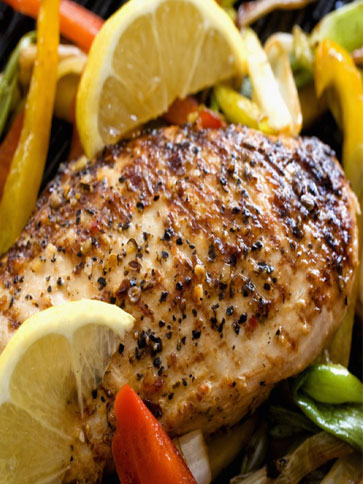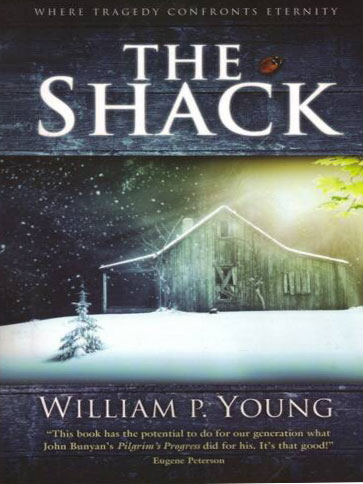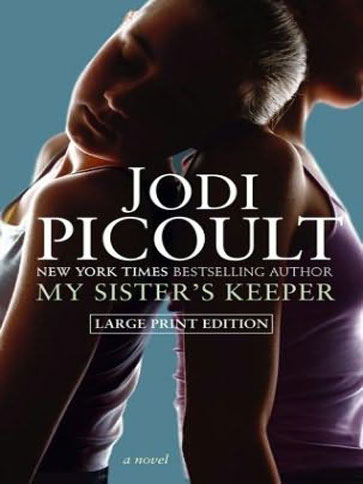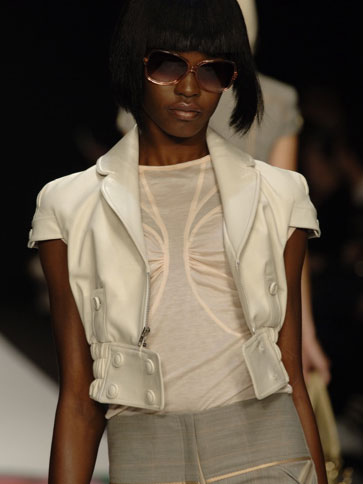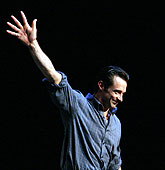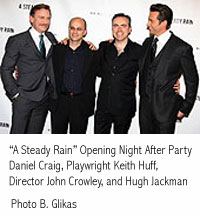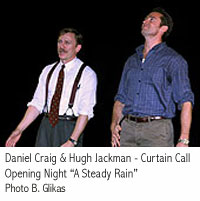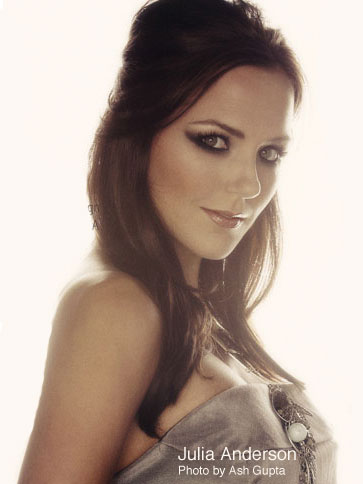 Julia Anderson, Winner of True Beauty and People Magazine‘s 100 Most Beautiful People, Is Living Life with No Regrets and Taking Her Dreams to a Whole New Level
Julia Anderson, Winner of True Beauty and People Magazine‘s 100 Most Beautiful People, Is Living Life with No Regrets and Taking Her Dreams to a Whole New Level
“I went to the show promising I’d stay true to myself, my beliefs, my convictions, and that I would not do anything that I regretted.”—Julia Anderson, Winner of True Beauty
Little did she know that her friend’s suggestion to enter the True Beauty competition would lead to a career-altering path. Julia Anderson had recently competed in the Miss Texas competition, which didn’t go as well as she had hoped, and decided to go to an audition her best friend found online.
“Are you gorgeous? Do people stare at you when you walk into a room?”
Thinking the ad was ridiculous, but still curious, Julia was just looking for something else to do. “I just happened to have the day off from school and my three part-time jobs at the time. I saw it as a sign, so I thought I’d go ahead and go to that audition. From one callback to another, I ended up in LA and on the show.
How many competitors were there trying to get on?
There were hundreds, no, thousands of people. The show had traveled all around the world looking for contestants.
What an honor to be named the winner out of all those people!
It really is an honor, and I am so blessed. It’s such a cool show to have won. It makes me feel so great for my family . . . and they’re excited . . . and it shows how I was raised. It’s an honor for all of us, my entire family.
What was the experience like?
Reality TV is difficult (laughs). You don’t ever really know what’s going on and they keep you in the dark about everything. So it was rough. I’m not going to lie. No music, no TV, no books, no magazines . . . nothing. So I was by myself with these other contestants for a  long period of time. And yeah, we were in a gorgeous house, but still we had no idea. You were literally living on the edge of your seat the entire time because you had no idea what was going on. It was a good experience. I learned a lot about myself, a lot about patience and how to live with nine other people in a house.
long period of time. And yeah, we were in a gorgeous house, but still we had no idea. You were literally living on the edge of your seat the entire time because you had no idea what was going on. It was a good experience. I learned a lot about myself, a lot about patience and how to live with nine other people in a house.
Did you find that there were some people who were particularly difficult to live with while you were doing the show?
When you’re sharing a room, a bathroom, and a kitchen, it does get rough. Everybody was good about switching out everything and sharing, and everybody on the show really was great. And so we were all very understanding.
What was your reaction when you realized that it wasn’t about the outward physical appearance?
I went to the show promising I’d stay true to myself, my beliefs, my convictions, and that I would not do anything that I regretted. I didn’t want to embarrass my family or my friends. If it had been any other reality show, I probably would have been the first one to get kicked off. It was just an honorable moment for me. I can’t even begin to describe the feeling once I found out.
it had been any other reality show, I probably would have been the first one to get kicked off. It was just an honorable moment for me. I can’t even begin to describe the feeling once I found out.
Did you discuss with your parents how you were going to be on the show once you actually got on it?
Of course people warned me about reality TV, the editing, the production, everything. I was cool. I knew that I was not going to do anything or say anything that I normally wouldn’t do or say. Reality TV isn’t bad if you go promising just to be yourself and don’t change and don’t do anything where you’re going to have regrets.
Were you shocked, or did you already have an idea that there was more to this contest?
All of us contestants had no idea that there was more to the contest. Little things would happen that were quite odd and strange. But we thought that it was just the producer trying to get in our heads, trying to produce drama to make good TV. Whenever funny stuff happened, we really had no clue that we were being judged on our inner beauty.
 There would be times where I would seriously look around the room for hidden cameras and couldn’t find any. And now when I watch the show, there were actually hidden cameras in there, especially the first episode when we were getting our beauty graded. They left all of the contestants’ medical files right on the seat next to me. I thought, “What’s going on here?” So I looked around and I really could not find any cameras. In that episode there were five cameras zooming in at every direction. Technology is crazy.
There would be times where I would seriously look around the room for hidden cameras and couldn’t find any. And now when I watch the show, there were actually hidden cameras in there, especially the first episode when we were getting our beauty graded. They left all of the contestants’ medical files right on the seat next to me. I thought, “What’s going on here?” So I looked around and I really could not find any cameras. In that episode there were five cameras zooming in at every direction. Technology is crazy.
It almost seemed like they were trying to trick you into going against your natural impulse. If it was me, I would have been dying to see what the other contestants’ results were.
I wanted to look at the other contestants’ pictures, but I didn’t want to touch the files because I knew that was wrong and basically illegal.
What was the most challenging part of the true beauty competition?
It was really not having any idea what you’re doing. One day they’d say get up, put on some clothes, we’re going to go camping. You just have to be ready for anything. And that gets exhausting, challenge after challenge. You just want some normalcy.
Do you have any fond memories?
All of the people were really great. We really had a lot of fun together. Whether it looked like it or not, we really are all still friends. We all keep in touch, and we really all learned a lot about ourselves because of each other. The most memorable time was when Ray kept running around the house naked. I try to forget that, but I can’t (laughs). Ray was the surfer, long hair. Then Billy and Joel were asleep (they’re the old timers), and Chelsea, Laura, Ray, and I were so bored that we resorted to playing hide and go seek. And then we decided to get our bed sheets, cut holes in them and pretend like we were ghosts and we tried to scare Billy and Joel. We were acting ridiculous, and that didn’t make TV?
it or not, we really are all still friends. We all keep in touch, and we really all learned a lot about ourselves because of each other. The most memorable time was when Ray kept running around the house naked. I try to forget that, but I can’t (laughs). Ray was the surfer, long hair. Then Billy and Joel were asleep (they’re the old timers), and Chelsea, Laura, Ray, and I were so bored that we resorted to playing hide and go seek. And then we decided to get our bed sheets, cut holes in them and pretend like we were ghosts and we tried to scare Billy and Joel. We were acting ridiculous, and that didn’t make TV?
Nobody in the house knew how to cook. Ray could cook turkey burgers, Laura could cook spaghetti, and Billy could make protein shakes, and that’s it. I was basically the designated cooker and that’s scary because everybody back home knows that I’m not a cook. I try, I have the best intentions, but we had Mexican fiesta every night because my specialty was chicken fajitas.
As a former beauty pageant winner—Miss Grapevine, right?—how do you think those pageant experiences helped you during the true beauty competition?
During True Beauty everyone kept referring to me as a pageant girl, and that’s simply not correct. I was a girl that did pageants. I did it for the scholarship money. It allowed me to do my community service, have my platform, and it opened a lot of doors. When people ask me if the pageants helped in any way, I say not really. It’s the way I was raised really. You have to be ready for anything or for everything. It’s about your character or how you handle yourself and the way you handle certain situations. Some pageant people are experienced in that, but I think mine’s just from the dedication of dance I’ve gone through my entire life. I would say dance has helped me more than the pageants.
Can you tell me about your dance experience?I started dancing when I was about 2-1/2 years old. I’ve been dancing ever since. It’s my passion. It’s my love. It’s what I do. It’s literally the best therapy. I dance almost every day. I take classes. I dance semi-professionally; however, I’m focusing on other things right now; but really dance is my passion, and that’s what’s gotten me where I am today as far as confidence, time management, discipline, etc.
What kind of dancing do you do and what is your training?
I am a performer for two different entertainment companies. I travel around the country for  corporate events. I’m a magician’s assistant, too. I’ve studied ballet, tap, and jazz, and point my entire life. Tap is my specialty. My #1 influence and who I look up to the most is Savion Glover. He’s an amazing tapper.
corporate events. I’m a magician’s assistant, too. I’ve studied ballet, tap, and jazz, and point my entire life. Tap is my specialty. My #1 influence and who I look up to the most is Savion Glover. He’s an amazing tapper.
What are your ultimate career goals?
I want to be a respondent, a host, or a reporter. Get paid to talk. I’d love to have my own talk show and hopefully be an inspiration to other people as well. True Beauty has opened so many doors. Tyra Banks, one of the producers, hired me as a correspondent for her show. She’s helping to make my dreams come true. She’s an amazing person, and I am so grateful for her.
You hear about these reality show people who win the competition and you never hear about them again. How has your life changed since the contest?
Since winning the contest, my life has changed quite drastically because I moved from Texas to LA and am pursuing my dreams. It’s opened so many doors. The prize money gave me the chance and ability to move. As far as everyday life, things are the same. Nothing has changed as far as my personal life, but as far as my career, it has changed overnight. I still spend time with my friends and family. I work. I play with my two doggies at home.
So what was it like to be one of People Magazine‘s 100 Most Beautiful People?
Being in People Magazine‘s 100 Most Beautiful People issue is the best thing that could have ever happened to me. Everybody goes to pick up that magazine. I buy it every year to see who made the list. I like to see who made the cut or not. And I made the cut this year! If you have dreams, pursue them and follow your dreams. If you can dream it, achieve it . . . really! I still get giddy whenever I think about it. I’m so excited. It’s such an honor to be a part of that magazine.
I remember something you said on the show, that you wanted to enter the Miss America Pageant and that you felt perhaps by winning the True Beauty Contest, it would help you get the recognition you need to help you win the pageant.
Not really. When I was Miss Teen Texas in 2002, I received a public intoxication ticket, and I gave up my title. I was depressed for a number of years and down in the dumps. Then I realized one day that you can’t lie around and have all these regrets. You have to really learn from your mistakes and move on. I can go and I can teach other kids not to make the same mistakes I did. I can be a learning tool. And that’s really why I went back to pageants. I won Miss Grapevine. I went to the Miss Texas organization as an outlet for that. But True Beauty was really a better outlet—national TV. It’s okay if you make mistakes—just learn from them. My new saying is “Have no regrets.”
Do you think that there will be another True Beauty contest?
Yes, I think there will be another contest. A lot of people ask how it could happen if 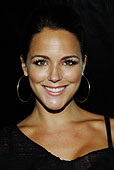 everybody already knows the secret. But Ashton Kutcher kept “Punked” going for a long time, and he’s one of the producers.
everybody already knows the secret. But Ashton Kutcher kept “Punked” going for a long time, and he’s one of the producers.
What is your definition of beauty?
I hate when people ask this question (laughs). Being 100% comfortable in your own skin whether you are short, tall, large, or small doesn’t matter as long as you love who you are and are comfortable with who you are. That’s my definition of true beauty.
Are you a role model?
To have come from almost nothing and come to where I am today shows so many people if you dream it you can achieve it. I think it’s so true. I realized I made mistakes and I’ve learned from them. I’m really hoping that other people can see that it’s okay if they make mistakes, too and learn from theirs as well.
learned from them. I’m really hoping that other people can see that it’s okay if they make mistakes, too and learn from theirs as well.
What are your own beauty secrets?
Hydrate. I try to go to the gym almost every day or every other day. I use a moisturizer. I’ve learned that less is more. I used to have eyelash extensions and those are long gone. Embrace the natural beauty. And that’s my number one beauty secret.
Lowest Low & Highest High
I was a dancer my entire life and I got into pageants because talent was 40% of the overall score. Then I won Miss Teen Texas. It was a huge dream of mine. Once I started pageants, I realized what you could do. The doors had opened. The people you can touch . . . it was a really huge honor. I messed it up. I did something really bad. I was a hypocrite. I was embarrassed and ashamed. I realized you can’t sit around and have regrets. My highest high was realizing on True Beauty that we were being judged on our inner beauty. I just remember thinking my family was going to be so happy, and that was definitely my highest high.
What advice would you give to someone who wants to be in a reality show?
They’re fun, you learn a lot about yourself. It’s a once in a lifetime opportunity. Don’t do anything you will regret. Think about your friends and family who will be watching—young and old, and stay true to yourself.
Interviewed by Kaylene Peoples
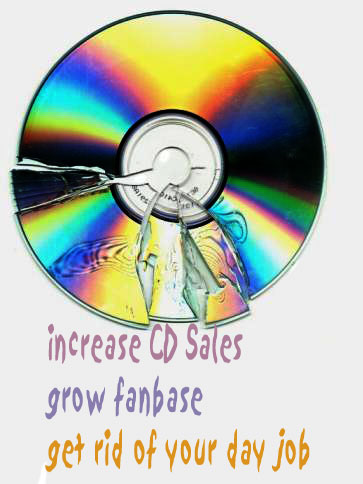 Who Else Wants to Sky Rocket Their CD Sales, Fan Base, and Indie Music Career?
Who Else Wants to Sky Rocket Their CD Sales, Fan Base, and Indie Music Career?

